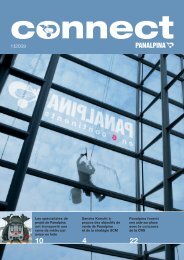Panalpina Annual Report 2006
Panalpina Annual Report 2006
Panalpina Annual Report 2006
Create successful ePaper yourself
Turn your PDF publications into a flip-book with our unique Google optimized e-Paper software.
Social commitment: Helping people<br />
see the future<br />
Since 2003, in collaboration with<br />
the Swiss Red Cross, <strong>Panalpina</strong><br />
has made substantial financial contributions<br />
to a longterm program<br />
to combat povertyrelated blindness<br />
in Ghana – with visible success.<br />
Besides its direct commercial obligations to all<br />
stakeholders, every company also bears social re<br />
sponsibilities that extend much further. A globally<br />
active group must ask itself how and where it should<br />
commit itself to improving humanity. <strong>Panalpina</strong><br />
decided at an early stage to focus its social sponsorship<br />
on a single sustainable program to deliver<br />
effective, measurable aid. To <strong>Panalpina</strong>, it is of<br />
additional importance to contribute to the development<br />
of a region in which it is active and knows<br />
the local conditions well.<br />
Since 2003, the Group has therefore been supporting<br />
a longterm program to combat povertyrelated<br />
blindness in Ghana. This initiative is part of the<br />
Vision 2020 – Right to Sight global commitment,<br />
through which the World Health Organization (WHO)<br />
aims to eliminate povertyrelated eye diseases<br />
throughout the world by the year 2020. Having<br />
been active in West Africa – where these diseases<br />
are widespread – for several decades, <strong>Panalpina</strong><br />
wishes to make an effective contribution to the<br />
campaign.<br />
Conducted by the Ghanaian and Swiss Red Cross,<br />
the program has the longterm objective of providing<br />
full, effective basic eye care at regional and<br />
local levels as part of Ghana’s healthcare system.<br />
<strong>Panalpina</strong>’s aim as a partner is to help to achieve<br />
the ambitious intermediate objective of halving,<br />
by 2010, the number of patients suffering illnesses<br />
leading to blindness. Since the project began, three<br />
regional eye clinics with local outstations have<br />
been set up in collaboration with the Ghana Health<br />
Service (GHS). By the end of 2005, these clinics<br />
had already treated 193,000 patients, while outreach<br />
teams had examined another 80,000 people<br />
in rural areas, and 56,000 children in schools.<br />
Medical treatment was provided for those who<br />
required it.<br />
While the infrastructure was successfully established<br />
over the past period, with specialist medical<br />
personnel being given basic and advanced training<br />
and healthcare programs being set up, the year<br />
under review saw a substantial rise in the number<br />
of examinations conducted. In <strong>2006</strong>, a total of<br />
243,242 Ghanaians received treatment: 88,938 in<br />
22 static clinics, 71,714 by specialists visiting rural<br />
areas and 82,590 children during visits to schools.<br />
In the same time, 1,533 cataract and 1,141 other<br />
operations were conducted, and 555 volunteers<br />
and school health teachers were trained. <strong>2006</strong><br />
therefore marked another major milestone on the<br />
road to achieving the objectives of Vision 2020 in<br />
Ghana.<br />
www.panalpina.com/society<br />
Sustainable Growth<br />
<strong>Panalpina</strong> <strong>Annual</strong> <strong>Report</strong> <strong>2006</strong> 5



![Eigenes Luftfrachtnetzwerk [pdf | 244 KB] - Panalpina](https://img.yumpu.com/23347328/1/184x260/eigenes-luftfrachtnetzwerk-pdf-244-kb-panalpina.jpg?quality=85)
![Übersicht Panalpina [pdf | 240 KB]](https://img.yumpu.com/22547731/1/184x260/ubersicht-panalpina-pdf-240-kb.jpg?quality=85)

![Seefracht [pdf | 181 KB] - Panalpina](https://img.yumpu.com/22234724/1/184x260/seefracht-pdf-181-kb-panalpina.jpg?quality=85)



![Annual Report 2012 [pdf | 1 MB] - Panalpina](https://img.yumpu.com/15342099/1/184x260/annual-report-2012-pdf-1-mb-panalpina.jpg?quality=85)






